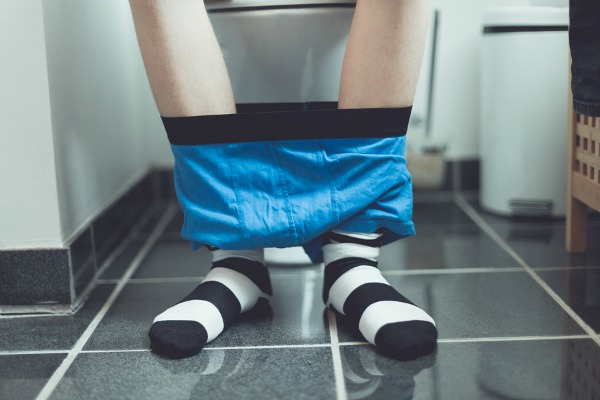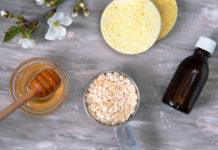
If you told my 20-something self I would one day be writing a post about childhood constipation, I wouldn’t have believed you.
And yet here were are!
While constipation in children is common and usually isn’t cause for concern, it can lead to complications or signal another underlying condition and shouldn’t be ignored. Some children deliberately hold their stools for a variety of different reasons, which can be a difficult habit to break and cause discomfort and frustration, and toilet training and developmental delays like autism and sensory processing disorder can make childhood constipation even worse.
If your life has become centered around your little one’s bowel movements, read on for some of our natural tips to bring you and your child relief!
What is constipation?
Constipation occurs when the passing of stool happens infrequently and/or the stool is difficult to pass. While some people have a bowel movement after each meal, others may only be able to empty their bowels a few times a week, and most of the literature I’ve read online suggests that anywhere from 3 bowel movements a day to 3 bowels movements a week is considered ‘normal’.
What are the symptoms of constipation?
If your child exhibits one or more of the following symptoms, childhood constipation could be to blame:
- Fewer than 3 bowel movements per week
- Bowel movements that are hard and difficult to pass
- Bowel movements that are so large they block the toilet
- Pain while passing stools
- Abdominal pain
- Liquid stool (sometimes resembling clay) in your child’s underpants
- Blood on the surface of the stool*
*If you see blood on your child’s stools, or on the toilet paper used to wipe her bum after a bowel movement, see her doctor immediately.
What causes constipation?
There are so many different causes for childhood constipation, including:
- Toilet training. While your little one may show all of the signs of readiness for potty training, pooing on the potty can cause a lot of fear and anxiety. Some children feel as though they are losing a part of themselves, others may become frightened due to a past painful bowel movement, and some may simply rebel as an attempt to maintain control.
- Medications. If your child takes medication and is experiencing constipation, make sure to ask your doctor or pharmacist if this could be a side effect of the medication she’s taking, and if there is anything you can do to offer her relief.
- Diet. We’ll talk more about diet in a minute, but what your child does and does not eat can have a huge impact on her ability to pass stools regularly.
- Changes in routine. Many parents report an increase in childhood constipation when their little ones start school, but other changes in routine, such as moving to a new home or going on vacation, can cause a child to become constipated.
- Sensory processing disorder. If your child has sensory challenges due to autism and/or sensory processing disorder, the feeling associated with passing stools, the sound of a toilet flushing, the smell of the bathroom, the fear of falling into the toilet, etc. can all cause her to hold her bowels.
- Trauma. A painful bowel movement, an encounter with an automatic flushing toilet, and other traumatic experiences can also cause a child to deliberately withhold her bowels.
PRO TIP: Carry a package of Post-It Notes in your purse to help alleviate the noise of automatic flush toilets when your child needs to use the bathroom outside of the home. Simply place one Post-It overtop of the flush sensor and viola! The toilet will not flush until your little one has finished her business.
How to avoid constipation naturally
While laxatives can certainly help relieve constipation, I’m not a fan of using them unless we really need to as they can cause abdominal pain, diarrhea, dehydration, and dependence if not used correctly. Here are some things you can do on the daily to avoid childhood constipation!
- Talk to your child’s doctor. If your little one suffers from childhood constipation, your first line of defense is to speak to her doctor to rule out any medical conditions that may be making it difficult to relieve her bowels. Is she taking medication that causes constipation? Does she have any food intolerances or allergies? Does she have any tears around her anus (anal fissures) that are making bowel movements painful? It is absolutely essential to rule out any medical causes or concerns before trying to treat constipation in children at home.
- Drink more water. Dehydration is a common cause for childhood constipation, so make sure your child is drinking plenty of H2O. If she isn’t a fan of water, a fruit infuser offers a natural way to add a little flavor, and I once read that sparkling water can aid in constipation (but don’t quote me on that!).
- Adjust your child’s diet. It’s no secret that a diet rich in fiber can help relieve constipation, but there are also foods your child should avoid, like cheese, fast food, processed food, and prepared foods. See below for our favorite kid-friendly, fiber-rich recipes!
- Encourage more exercise. Regular physical activity helps stimulate our bowels, so encourage your kids to put down their tablets and smartphones and go outside to play, and make it a habit to go for a walk around the neighborhood each day to ensure the whole family finds time to get up and move.
- Consider a probiotic. I’m a huge fan of probiotics as they are said to boost our immune systems, improve digestion, and heal inflammatory bowel conditions, but they aren’t for everyone. Make sure to speak with your child’s doctor before administering a probiotic and do your research to find a brand you trust.
- Avoid dairy. A diet high in cheese and eggs can slow down your digestive system, so consider cutting back on these foods if your child suffers from constipation. Just be sure to talk with your child’s doctor to ensure she is still getting the recommended daily dose of calcium in her diet.
- Retrain the bowels. When childhood constipation becomes chronic, some doctors and naturopaths will recommend doing a clean-out of your child’s bowels followed by bowel retraining. I won’t go into too much detail about the clean-out protocol as I feel this is something that should only be done under the supervision of a trained medical doctor, but I’m a huge proponent of bowel retraining. This involves maintaining a healthy diet and regular physical exercise each day, and having your child sit on the toilet after each meal for a specified period of time (a good rule of thumb is one minute for each year of age). It can take months for the bowel to be properly retrained, but with consistency, you can help your child’s body get into the habit of having a bowel movement at a certain time each day.
- Use reward charts. When childhood constipation is a result of deliberate poop withholding, reward charts (we love this reward chart!) can be an excellent motivator when used correctly. Another idea is to have a ‘treasure box’ filled with small toys in the bathroom. Each time your child is successful in emptying her bowels, she can select and play with one toy for 5 minutes.
RELATED: 8 TIPS TO OVERCOME POOP WITHHOLDING
Foods to help with constipation
One of the trickiest parts of childhood constipation, in my opinion anyway, is trying to find ways to get picky eaters to eat high fiber foods. The internet is filled with all kinds of recommendations – from prunes to vegetables to bran cereals – and while these suggestions can certainly work wonders when it comes to constipation in children, the reality is that a lot of children simply will not eat these foods. Fortunately, there are HEAPS of parents who have already done the hard work, and I’ve rounded up some of my favorite high fiber recipes for kids!
Gluten Free Vegan Black Bean Brownies | the pretty bee
High Fiber Broccoli Smoothie | Super Healthy Kids
Honey, Wheat & Flaxseed Pancakes | Picky Palate
Oatmeal Apple Banana Muffins | Rock Recipes
Constipation Candy | mommypatamus
Prune Breakfast Cookies | Recipe Runner
Blueberry & Spinach Smoothie | Create Kids Club
Double Chocolate Black Bean Cookies | The Nourished Seedling
Crispy No Bake Energy Balls for Kids | Bren Did
Banana Chia Seed Pancakes | Super Healthy Kids
Sweet Potato Hummus | Kids Eat Vegetables
Constipation Cookies | Lori Miggins
Veggie Pops | Kids Activities Staff at The Maven
Childhood constipation is no joke. I have memories of my own mother forcing wheat bran and Milk of Magnesia down my throat as a child, but I like to think we’ve come a long way since the 1980s in that we have more natural remedies and tips we can employ to help understand the reason behind constipation in children so we can prevent it from happening in the first place. I hope these tips to relieve childhood constipation help you and your little one get back on track, and the yummy recipes offer stress-free ways to get more fiber-rich foods into your child’s diet!
















